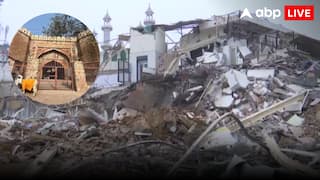Roadmap For Amicable Assam-Meghalaya Border Row Settlement Prepared: CM Himanta
The areas of differences taken up for final settlement in the first phase are Hahim, Gizang, Tarabari, Boklapara, Khanapara-Pillingkata and Ratacherra, he added.

Guwahati: Assam Chief Minister Himanta Biswa Sarma on Tuesday said that the roadmap for amicable settlement of border disputes with Meghalaya in six areas of difference has been prepared through mutual consultations at the top level of the two governments.
The opposition Congress, however, called for more discussion on the matter, particularly in the state Assembly, saying that the government has proposed an approach in which both states would lose or get some areas.
Our efforts to resolve the Assam-Meghalaya border row have started bearing fruits as 6 of the 12 areas of difference have been identified for resolution in the first phase, Sarma tweeted after an interaction with leaders of political parties of the state on the Assam-Meghalaya boundary dispute.
The areas of differences taken up for final settlement in the first phase are Hahim, Gizang, Tarabari, Boklapara, Khanapara-Pillingkata and Ratacherra, he added.
Out of the 12 points of disputes between Assam and Meghalaya, these six areas with relatively less critical differences have been taken up in the first phase.
A roadmap for amicable settlement has been prepared based on recommendations of 3 Regional Committees with representatives from both the states. We've reached this stage after several rounds of CM-level talks on the matter, Sarma said.
Representatives of various political parties such as the Congress, CPI(M), Asom Gana Parishad, Bodoland People's Front and the All India United Democratic Front were present at the meeting.
They were briefed on the progress made in the talks so far, the chief minister said.
In the Twitter post, Sarma did not go into details of the "roadmap for amicable settlement".
Talking to PTI after the meeting, Leader of the Opposition Debabrata Saikia of the Congress said a very small portion of the area that is under dispute between the two states has been taken up for resolution.
"The government has proposed a give-and-take approach where both states will let go or receive almost an equal area. We feel that there should be a discussion in the Assembly before any proposal is finalised, Saikia said.
The Congress has asked for a discussion on the findings of the regional committees in the Assembly, he said.
"We were shown a presentation on the matter," the Congress leader said.
Saikia questioned the absence of Border Area Development Minister Atul Bora in the meeting.
He not only is the minister directly involved, but also heads one of the three regional committees. Only two ministers were present in such a crucial meeting, Saikia said.
Ranoj Pegu, minister for education and welfare of plain tribes & backward classes, and Ashok Singhal, minister for housing & urban affairs and irrigation, attended the meeting.
Saikia said more discussions on the matter were required, especially in the Assembly.
Chief Minister Sarma had on January 12 said that both governments have arrived at mutual understanding' over these six areas of boundary dispute and an agreement can be expected within this month if civil society organisations and opposition political parties come on the same page as the governments.
In principle, both governments have reached a consensus that our assessments on the disputes are the same, he had said after a meeting with his Meghalaya counterpart Conrad Sangma here.
Four rounds of chief ministerial level talks between Sarma and Sangma have taken place over the border issue since Sarma assumed office in May last year.
Three committees each were formed by the two state governments in August 2021 after the first two rounds of talks between Sarma and Sangma to resolve the vexed border disputes in a phased manner.
Meghalaya was carved out of Assam as a separate state in 1972 and it had challenged the Assam Reorganisation Act, 1971, leading to disputes at 12 areas in different parts of the shared 884.9 km long border.





































